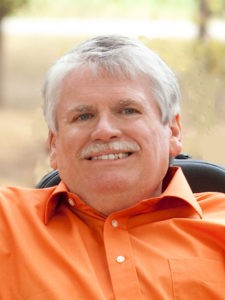I’ve been to my share of doctors. Many of those visits happened when I was so young that they have no conscience in my adult brain. My earliest memories were of Dr. Matchett, an orthopedic surgeon who was assigned the task of helping me regain what I had lost to polio. I remember him because of his gruff bedside manner. His training included treating wounded soldiers on the European battlefield during the war.
I dreaded visits to Dr. Matchett because he scared me. His grey hair was perfectly coifed into a one-inch flat top, and he barked out orders to his nurse as if he were still a colonel in the Army. Every time he saw me, he grabbed my crooked foot, twisted it straight, and said to my mom, “This is the way it should look, and when he’s old enough, I’m going to fix it.” It was painful; I hated it. When I turned 17, he did what he promised and fixed both of my feet and made it possible for me to wear normal shoes.

Terry Austin
As painful as it was visiting Dr. Matchett, if it were not for him repairing my feet and other stuff he did with my spine, I wouldn’t be here today. He knew what was needed for me to live to old age. The gruff doctor had a special place in our family, and we learned that when he said something was needed, we should listen. Years later, when he died, my mother sent his obituary to me, and I’ll admit, I grieved.
The American church is in a similar situation today, and healing words are needed. When I use the term “healing words,” it’s not a reference to meaningless affirmations to make someone feel good. By “healing words,” I mean instructive words, the kind a doctor provides after diagnosing a patient.
Here is my prescription for the American church:
Get rid of Christian nationalism
For me, Christian nationalism began as a kid in Vacation Bible School. For two weeks in the summer, each morning, we stood and pledged allegiance to the American flag. It never made sense that our first allegiance was to the American flag, then the Christian flag, and then the Bible — the order perplexed me, even as a kid.
The pinnacle of Christian nationalism was in view on the afternoon of Jan. 6 as rioters stormed the Capitol building in Washington, D.C. Christian flags were displayed alongside American flags and Trump flags. The cross, the ultimate symbol of the Christian faith, also was a dominant feature carried and worn by rioters. If you watched on TV, you noticed signs reading “Jesus Saves” and “Jesus 2020” scattered throughout the crowd. The most obvious example was the video of rioters having a prayer service in the Senate chamber, closing with the words, “in Jesus’ name.”
Christian nationalism has dotted the history of the United States since the beginning. In my lifetime, it has reared its head frequently, insisting on the right to have prayer in school, demanding the right to display the Ten Commandments in government buildings, expecting teachers to present the Christian doctrine of creation, and complaining if an official prayer is offered by a leader of any other religion.
“The foundation for the false notion of Christian nationalism is that the United States of America is the new Israel.”
The foundation for the false notion of Christian nationalism is that the United States of America is the new Israel: Just like God called and established the nation of Israel, God established the nation of America. What’s best for America is also what’s best for God’s people. When we fight for public prayer, Scripture-based laws, and protections from other religions, we are doing God’s work. It’s a good thing to celebrate as patriots in our church buildings because we are celebrating God when we celebrate America.
The problem with this thinking is that it’s wrong. Read the book of Romans. The new Israel is not America; the new Israel is the church. Israel, God’s people, became the church when God grafted them together (again, reread Romans 11 and Paul’s analogy of a tree). We need to stop treating the Middle Eastern Israel of today as well as the United States as God’s chosen nation.
American Christians should be patriotic. Don’t hesitate to say the Pledge of Allegiance to the flag or sing the National Anthem (if you can). Enjoy the Fourth of July fireworks, applaud those who serve the country. Pray for our country and seek God’s guidance as you enter the voting booth. It’s appropriate to speak of God’s grace when something good happens to our country and even to sing, “God Bless America.” However, realize that God blesses other nations, and being an American doesn’t make you any more special or acceptable. Salvation and national blessings are available to people of every country.
Christian nationalism has spread like cancer through the church, and if treatment waits much longer, the prognosis is grim. Ridding the church of this disease requires a massive commitment to the truth on the part of courageous people.
I was pastor of a small church for 13 years, and the presence of an American flag in the sanctuary bothered me the entire time. However, I didn’t have the courage to stand up to those 75 people and remove the flag. These tiny seeds of nationalism have become full-grown and sapped health and life from the church.
Do something about leaders motivated by money, sex or power
In the late 1980s, I discovered a book written by Quaker theologian Richard Foster titled Money, Sex, and Power and gained a new understanding of sin. Foster describes these as the three greatest temptations we face. They also describe the three things that lead church leaders astray.
When it comes to money, think of Kenneth Copeland or Joel Osteen. They are probably the most familiar of those who have wandered away from the faith (see 1 Timothy 6:10). Apparently, the problem has been around since New Testament days, and I’ll go out on a limb and say that ministry can be especially lucrative in today’s world. I taught Christian stewardship for many years, and you would not be surprised to hear that I met countless people who walked away from the church because of the constant “begging” for money.
“Some have been known for preaching an extremely conservative sexual behavior while living an extremely promiscuous sexual life.”
When it comes to sex, think of Jerry Falwell Jr. or Carl Lentz. Once again, I must say that they only top the list that is quite long and dotted with highly recognizable names. Some have been known for preaching an extremely conservative sexual behavior while living an extremely promiscuous sexual life. I’m not talking about someone who slipped up once. I reference those church leaders who have created a sexually active lifestyle at odds with Jesus’ teaching. Is it any wonder the message of the church has little power to affect lives?
The prescription requires a totally different approach to the way churches and pastors relate. Situations where pastors are not accountable to the church need to become unacceptable. If sex is such a great temptation, the church needs to stand with the church leader in overcoming it.
Alcoholics Anonymous provides a good model with group meetings to encourage one another and a sponsor who is always there for the addict. Church leaders need to find this kind of help because sexual immorality is destroying the church. The evangelical church has watched for decades as the Catholic Church struggled with this problem, but it’s equally real for them.
When it comes to power, think of Donald Trump and many of his followers. You might be surprised that I list Trump as a church leader. Think about it. Is there anyone who has been a greater influence on the American church in the past five years? It might even be a close race between Trump and Jesus as to who has had the greatest impact on the church recently.
“It might even be a close race between Trump and Jesus as to who has had the greatest impact on the church recently.”
Trump was not tempted by money; he already had more than he needed. Neither was he tempted by sex because it appears he had an abundance of that as well. What tempted him was power. He wanted the most powerful position in the world — president of the United States. He grabbed the horns of Christian nationalism like a rodeo cowboy grabbing a wild bull, and together they tore through democracy and the U.S. Constitution like it was a china shop. (Don’t you love a mixed metaphor?)
The American church is filled with leaders who have parlayed their positions into places of power, influence and control. Trump recognized the desire for power among these people, and he gained their trust and support with a promise of access to his power. In other words, he gave them his cell phone number. The prescription for the church is to reclaim the power that has been given to these people and put it back where it belongs — in Jesus.
BYKOTA
There is a church in Amarillo, Texas, named Bykota Baptist Church. It’s an unusual name, and when I first heard about it, I assumed the community had been named after someone and the church simply took the same name. When my father became interim pastor, I discovered the reason for the name. Bykota is a pneumonic device for remembering Ephesians 4:32, which exhorts, “Be ye kind one to another.”
The church needs “bykota.” Some of the ugliest, most hateful comments I have read on Facebook have been posted and shared by Christians. It needs to stop. It’s fine to argue political positions, even theological matters, but the name-calling and unkindness are unnecessary and ruining the church. Not only within the congregation but reputation in the world.
A parting word
Early in the summer of 1968, on a Monday morning, the day after my high school graduation, Dr. Matchett twisted my foot for my mother one last time. On that day, he kept his promise to fix my feet. I was wheeled into surgery, where he cut three notches in the bone on the outside of my foot, twisted my foot straight, inserted a pin to hold it, and wrapped it in a plaster cast. Six weeks later, the cast was removed, and my foot was straight.
“For the church, the disease of sin already has been cured via forgiveness, but the effects of sin are still prevalent.”
Dr. Matchett didn’t cure my polio; the disease was long gone. Instead, he lessened the effects the disease had on my fragile body. For the church, the disease of sin already has been cured via forgiveness, but the effects of sin are still prevalent.
Repairing damage can be difficult. I spent the entire summer of 1968 in the hospital with three surgeries, multiple plaster casts and stitches, but was able to get out in time to start college for the fall semester.
I have to believe there is hope for the church to get it together, fill the prescription and move toward health.
Terry Austin says from his first day of life he was taught to love the church. He has lived out that passion in various ways as a pastor, church consultant, author and critic. He is currently a full-time writer and book publisher and actively engaged with house churches.


